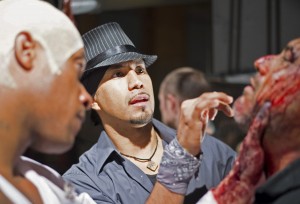The original version of this article contained an error and has been changed. See the bottom of the article for additional information.
Dallas King’s home office overflows with cinema. In his work space quarantined off in the corner, three foundational posters – “Zulu,” “Jason and the Argonauts,” “Clash of the Titans” – hang proudly. The top shelf of his desk is littered with awards, most noticeably the Directors Guild of America West Region Jury Award for his short, “Most Wanted.”
But most prominent are posters of his film in progress: “Hozon,” the first-ever feature-length film approved by the UCLA School of Theater, Film and Television as a thesis project.
Born into a family with an incurable hereditary retinal disease, King had a 50/50 chance of going blind. He didn’t, but the disease formed the basis for “Hozon,” a horror film about a cure gone wrong.
“I was blessed with sight,” King, a fourth-year graduate student in film, said. “But I wondered how a family would cope with an incurable disease – a powerful, affluent family – and how far they would go.”
King mixed fact with fiction and wrote a screenplay using epilepsy as the disease. He shot a three-minute trailer for $5,000 and was determined to make the feature-length film his thesis project.
But the problem is that “Hozon” is huge. Unconventional for a film school project, the film is a genre flick, a mixture of science fiction and horror that required costumes and effects – and money. King had prepared a 240-page packet in February to try and get “Hozon” approved, approximating the cost of the film at $500,000 to $700,000.

UCLA has long imposed length restrictions on thesis films. It was mostly out of necessity, as the cost of film stock itself would have made most features financially impossible. But with digital technology, times are changing, and King is blazing the trail for more ambitious student films.
“I’m always trying to break the rules; I was very transparent about what I was trying to do from the moment I stepped into this school,” King said. “My vice chair told me that I was going to be the sacrificial lamb – the first through the fire.”
Fabian Wagmister, vice chair of the production/directing program at the UCLA School of Theater, Film and Television, was responsible for bringing about the policy change. He said that King’s proposal at the time was too ambitious.
Feasibility is the core to the change in policy, Wagmister said, not simply length.
“Before, there was a strict time limitation, which we simply eliminated,” Wagmister said. “Now students have to prove to us that their film is feasible and that it can be made, whether it’s five minutes or five hours.
King’s project, along with a number of other proposals, contributed to this year’s more focused reconsideration of the rule, Wagmister said.
Gerren Crochet, who is co-producing “Hozon” and graduating from the production/directing program this year, is excited about the change.
“I think UCLA’s really showing its support for its students,” Crochet said. “It shows that our school is staying on the cutting edge.”
King expresses the same excitement – he even created his own letter jacket for UCLA Film, to wear on set and express pride.
“Like I was telling Gerren, it makes for a good story,” King said. “It wasn’t a lot of yeses – it was a lot of nos. But in the end I can say that UCLA supported our film, and I can be proud to raise the UCLA Film flag high.”
One of the ways King is making good on UCLA’s support is getting his film seen. Fiorela Canaj, a co-producer of the film who recently signed on, is helping with future distribution.
With more than 15,000 likes on its Facebook page, there’s certainly an audience for “Hozon.” Leveraging recent sponsorships by ARRI and Panavision, the team is also launching a Kickstarter in order to cast genre actors that would please the fanbase.
“Dallas is very passionate and gets you excited about the work,” Canaj said. “Whether it’s limited release or video on demand, we want the film to be seen.”
Correction: “Hozon” is not the first feature-length film to be approved as a thesis project by the UCLA School of Theater, Film and Television.

Great job, Dallas! Do what you want to do, don’t let anyone hold you back!
Thank you V for the support! Go Bruins!